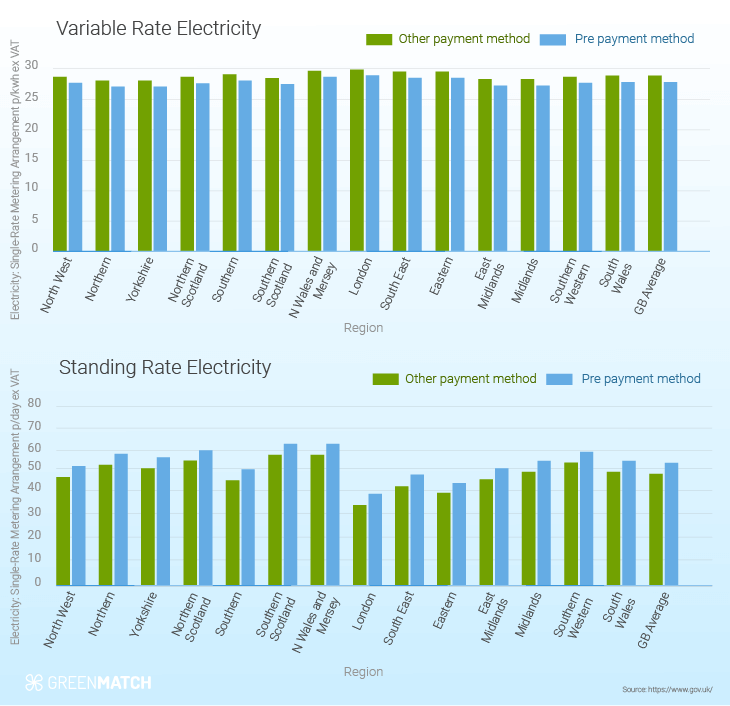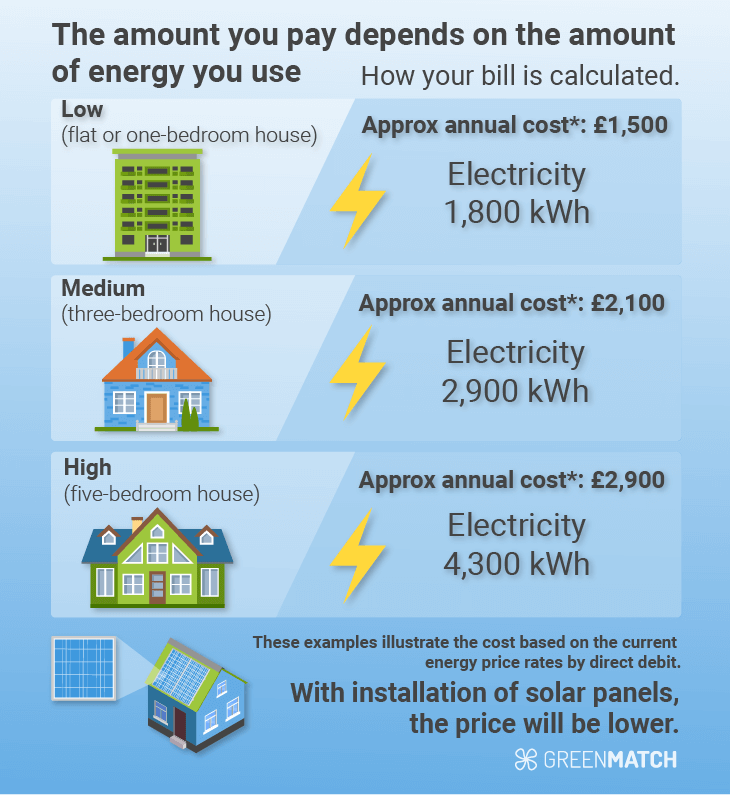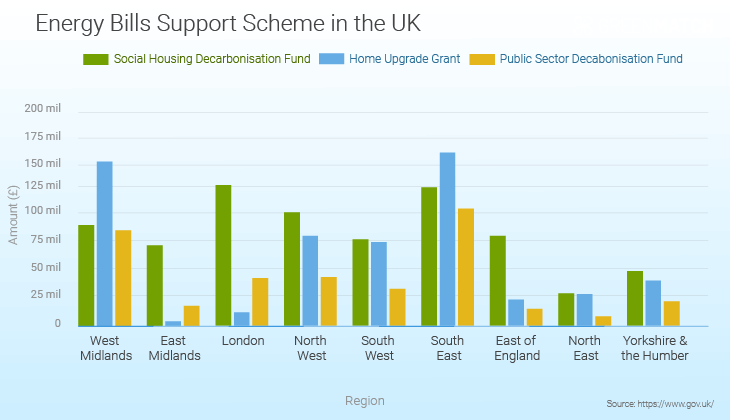Answer these simple questions and we will find you the BEST prices
Which type of solar quotes do you need?
It only takes 30 seconds
100% free with no obligation

Get up to 4 quotes by filling in only 1 quick form

Slash your energy bills by installing solar panels

For the average 2-3 bedroom house
- GreenMatch
- Blog
- UK Energy Bill
UK's Green Energy Initiative: The Energy Bills Support Scheme

In the UK, many families are worried about their energy bills, which have been rising, yet the value of having low-carbon and renewable energy sources cannot be overstated. These energy sources do not emit much carbon and are necessary for addressing climate change.
The UK government is making strides towards a greener future with the Energy Bills Support Scheme, a key initiative to promote sustainable technologies and reduce carbon emissions. This scheme is part of the broader strategy to achieve net-zero carbon emissions by 2050, driving industries and non-domestic customers to adopt energy-efficient practices and technologies.
In 2020, 42% of the UK's electricity came from renewable energy, with wind power being the highest proportion of any G20 country and more than four times the global average.
The UK's reliance on gas to heat homes, generate electricity, and fuel heavy industry has come at a steep cost, which is expected to keep rising. Therefore, generating more electricity from renewable energy is a guaranteed way to avoid firing up gas power plants and protecting electricity bills from rising.
An examination of the significance of low-carbon and renewable energy in the United Kingdom and how it could be used to lower energy costs will be conducted in this article.
Energy bill price cap and government price guarantee
To protect consumers from high energy costs, the government has implemented an Energy Price Cap by Ofgem, the independent regulator for the UK's energy market. This cap limits the amount suppliers can charge for each kilowatt hour (kWh) of energy. The cap also ensures suppliers' profits remain in check, with the pricing recalculated every six months considering the current wholesale energy prices.
Every three months, Ofgem establishes the Energy Price Cap, the highest amount suppliers can charge customers on their standard or default tariff. This cap applies to households that use an average amount of energy.
From July to September 30, 2023, households in England, Wales, and Scotland are subject to the Energy Price Cap, establishing the maximum energy cost.
For a dual fuel household paying by direct debit with typical consumption levels, the annual cost of using regular energy in England, Wales, and Scotland is £2,074. This is £426 less than the yearly rate.
This graphical representation illustrates the current energy rate in the UK.

Households that consume a lot of energy will be charged a higher amount, while those that use a smaller amount will be charged less. The ceiling for the price of bills for July is lower than the last quarter's, resulting in customers spending less on their bills.
Every six months, the power bill is adjusted by the wholesale energy costs determined by Ofgem every three months. It is predicted that this assessment will be altered in October 2023. The Energy Cost Assurance will stay a security net up until the conclusion of March 2024 if energy prices soar higher than £3,000 per annum.
An image of a UK Energy Bill calculator is presented, which can be used to calculate bills by building.

Energy bills support scheme
The British economy has advanced substantially in its efforts to reduce carbon emissions. From 1990 to 2021, the UK achieved a 48% reduction in emissions, even as the economy grew by 65%. This rendered the UK the first G7 nation to commit to net-zero greenhouse gas emissions by 2050 legally.
Several schemes and initiatives have been implemented to reach these goals, such as the Energy Bills Support Scheme. This has been created to help households and businesses with difficulty paying their energy bills due to increasing costs.
The UK government is also exploring energy demand reduction options to reduce carbon emissions (Co2). Energy demand reduction can minimise reliance on high-risk carbon dioxide removal technologies and has moderate investment requirements. Given its legally binding targets for short- and long-term greenhouse gas emissions, the UK government is using the country as a case study to explore this potential.
To cut emissions from state-run buildings, the government has initiated several measures, such as the UK Energy Bills Support Scheme, to reduce pollution by 75% by 2037 compared to 2017.
The government has pledged to decrease the UK's energy demand by 15% by 2030, and this plan is a step towards the country's goal of achieving increased energy autonomy.
A graphical representation of the UK's energy bill scheme can be seen in the image below. This scheme serves to provide affordable energy costs for households in the country.

Connecting the Dots: Carbon Emissions Reduction
The Energy Bills Support Scheme implemented in the UK seeks to unite households to reduce collective carbon emissions. It does this by offering renewable energy solutions and energy-efficient technologies to individuals, which will lead to a significant drop in carbon footprints at the local level.
The UK government's overall plan to reach net-zero carbon emissions by 2050 is reflected in this knock-on effect. They attempt to cause systemic modifications in different sectors and non-domestic customers to embrace energy-efficient techniques and technologies.
Green technologies play a crucial role in reducing carbon emissions and promoting sustainability. By guiding readers towards eco-friendly choices, we can significantly contribute to the field of renewable energy and environmental sustainability.
Here are some key points about the UK Energy Bills Support Scheme and its connection to reducing carbon emissions:
- Discounts on Energy Usage: The scheme provides deals on non-domestic gas and electricity unit prices for eligible customers. By lowering the cost of energy, businesses and non-domestic customers are encouraged to use power more efficiently. This, in turn, inspires them to invest in renewable energy sources, ultimately reducing their carbon footprint.
- The scheme also promotes energy efficiency measures, such as improving insulation and adopting low-carbon alternatives. By making homes and buildings more energy-efficient, energy consumption can be reduced, lowering the UK energy bill and decreasing carbon emissions.
- The UK Energy Bills Support Scheme applies to customers in England, Scotland, and Wales. Electricity suppliers in these regions have received and distributed funding to support domestic energy customers.
- Electricity suppliers are responsible for implementing the Energy Bills Support Scheme direction and delivering the scheme. They must discount eligible customers by crediting their accounts with the relevant amount. Customers do not need to apply for the plan, as they are automatically identified and notified by their electricity supplier.
UK's clean energy bill revolution
The United Kingdom is spearheading the clean energy transformation, intending to phase out carbon-based fuels by 2035. This strategy provides optimism as the world is confronted with increasing temperatures, unanticipated weather conditions, and the necessity to reduce greenhouse gasses produced.
An endeavour of significant scale has been proposed to combat the pressing concern of climate change. This plan strives to ensure energy reliability, lower living costs for residents, and establish a vigorous green economy.
The UK has vowed to decarbonise its electricity system by 2035, with a budget of £205 million allocated to the initiative. This endeavour strives to expand the usage of inexpensive, green, and domestically sourced energy, leading to multi-billion-pound investments in renewable energy sources.
The UK emphasises adopting homegrown, green technologies like solar panels and offshore wind. This is done to decrease reliance on fossil fuels and minimise the effect of unpredictable global energy costs. This shift safeguards the nation's energy security and promotes a feeling of energy autonomy. It protects family energy costs, guaranteeing a secure and sustainable future.
The UK aims to transition away from reliance on carbon-based fuels by 2035, which is in line with what the Committee on Climate Change (CCC) has suggested. The CCC has created a world where oil demand is reduced by 85%, and renewable energy sources are more crucial in providing the country with its energy requirements.
As the Clean Energy Revolution and the Energy Bill Scheme entwine their strengths, the UK's carbon fuel phase-out by 2035 emerges as a resolute mission. The harmony between these two strategies accentuates the feasibility of this ambitious goal. This demonstrates the nation's dedication to tackling the climate emergency.
Future Outlook and Steps UK Energy Bills
For many nations, including the United Kingdom, the quest to reach net-zero emissions and utilise green technologies is a paramount focus. This transition will have a major impact on how people go about their everyday lives, from areas such as transport, heating, cooking, urban design, and job opportunities.
According to government estimates, approximately 55% of the cumulative emissions reductions in the pathway result from consumer choices. These choices include purchasing an electric vehicle, retrofitting a house with energy-efficient technologies, or installing a heat pump. The goal will require continued investment in green technologies and sustained support from citizens.
One of the government's strategies for encouraging green technologies and lowering carbon emissions is the Energy Bills Support Scheme.
The future of green technologies in the UK looks promising, with the government implementing various initiatives like the Energy Bills Support Scheme. As we continue to guide readers towards eco-friendly choices, we can significantly contribute to the field of renewable energy and environmental sustainability.

Inemesit is a seasoned content writer with 9 years of experience in B2B and B2C. Her expertise in sustainability and green technologies guides readers towards eco-friendly choices, significantly contributing to the field of renewable energy and environmental sustainability.
We strive to connect our customers with the right product and supplier. Would you like to be part of GreenMatch?

